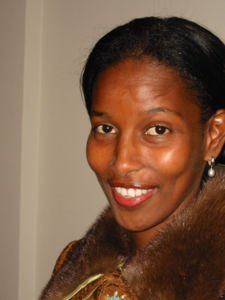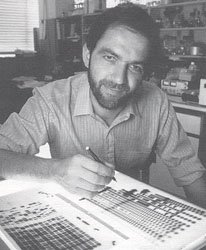Nobel Weeks

The 2006 Nobel Prizes will be announced this week and next, beginning with Medicine–10/2, Physics–10/3, Chemistry–10/4, Economics-10/9, Peace-10/13 and Literature-10/?? Today I’ll make my Medicine prediction and my hope for the Peace Prize; other predictions and commentary to follow.
My selection for the 2006 Nobel Peace Prize is the lovely and brilliant and brave Ayaan Hirsi Ali, prominent member of the Lower House of the States-General of the Netherlands from 2003-2006, author, film maker, and critic of Islam.
In May 2006, after numerous threats to her life, Hirsi Ali resigned from parliament and announced that she would move to the United States to work at the American Enterprise Institute (to research the relationship between the West and Islam; women’s rights in Islam; violence against women propagated by religious and cultural arguments; and Islam in Europe.) She arrived in September and was warmly welcomed by the US Department of State.
Ayaan Hirsi Ali was born in Mogadishu, Somalia in 1969 to Muslim parents. When she was only five years old, Hirsi Ali’s grandmother had the female genital cutting procedure performed on her while her father was away. She grew up a religious Muslim. In 1992 her father arranged for her to marry a distant cousin living in Canada. She escaped the arranged marriage by immigrating to the Netherlands where she received political asylum.
At first Hirsi Ali held various jobs in house cleaning and mail sorting while taking courses in Dutch and in Social Work. She worked as an interpreter for Somali women in asylum centres and hostels for battered women while studying political science at the University of Leiden until 2000.
After earning her masters in political science, Hirsi Ali became a fellow at a scientific institute and she renounced Islam. She entered politics and was elected to the Dutch parliament. In parliament, she worked on furthering the integration of non-Western immigrants into Dutch society, and on defending the rights of women in Dutch muslim society.
In 2004, together with director Theo van Gogh, she made Submission, a film about the oppression of women in Islamic cultures. The airing of the film on Dutch television resulted in the assassination of van Gogh by an Islamic extremist. A letter pinned to Van Gogh's body with a knife was a death threat to Hirsi Ali.
In November, 2005, an Imam of a mosque in The Hague announced that Hirsi Ali would be "blown away by the wind of changing times" and that she could anticipate "the curse of Allah".
In January 2006, Hirsi Ali urged action to prevent Iran from developing nuclear weapons and said that Mad Mahmoud Ahmadinejad must be taken at his word in denying the Holocaust. "Before I came to Europe, I'd never heard of the Holocaust. That is the case with millions of people in the Middle East,” she said.
Her latest book is The Caged Virgin: An Emancpitation Proclamation for Women and Islam.
Victor Davis Hanson (Hoover Institution) said of Hirsi Ali: “At great risk to her person, she has spoken out against the subjugation of women, the cruelty of Sharia Law and the undemocratic nature of Middle East Regimes. She deserves the world’s gratitude and protection.”
And the Nobel Peace Prize.
My pick for runner-up is President George W. Bush for keeping the savages from striking inside the United States for over five years.
Honorable mention to John Bolton for standing up for the United States and for reform in the United Nations while under constant attack from the US Democratic Party and most of the rest of the world.
Unfortunately, the world is so corrupt and anti-US that the likely wiener will be Kofi Annon for his patience in not dealing with the genocide in Dharfur. Dishonorable mention goes to the League of Arab States that opposes any intervention in that little African unpleasantness.

The front runner for the medicine prize is Sir Alec Jefferys, FRS, for his pioneering development of DNA fingerprinting and for its applications to forensic analysis and the understanding of genetic diseases. Jeffreys, 45, is a professor in genetics at the University of Leicester, UK.
The latest big thing in Jefferys’ work is DNA amplification by polymerase chain reaction (PCR) that may lead to DNA chips. “If one could create an electronic chip in which an oligonucleotide could detect and transduce the detection of a product (such as a PCR product) into an electronic signal, that would open up forensic typing, DNA typing, medical diagnostics, and just about everything else one can think of.”
Experimentally proven fundamental science with important real world applications is what the Nobel should be about, and in this respect Jefferys stands out.

4 Comments:
Hey Bill, I saw Ayaan Hirsi Ali in an interview and was very impressed with this gentle, strong, intelligent woman. She is out there speaking the truth at great risk to herself. I respect that in anyone; it is so rare.
I find most people just in their daily lives living here in the land of the free, will not risk much. When it comes to speaking what is true and right I find a lot of "clams" who are shut up tight. :-)
I, as anyone who knows me well (and sometimes grimaces about it), am not a clam...
Dori
Hey Dori,
Well said. I also saw Ayaan on TV and was totally impressed. I hope she becomes an American. She is well situated at the AEI with all the brilliant conservatives.
I'm glad you're no clam.
Americans Andrew Z. Fire and Craig C. Mello won the Nobel Prize in physiology or medicine Monday for discovering a method of turning off selected genes, an important research tool that scientists hope will lead to new treatments for HIV, cancer and other illnesses.
Gene
WOW what a woman!! She rightly deserves it.. Am very pleased with your runner up!!!!!
Rose
Post a Comment
Subscribe to Post Comments [Atom]
<< Home